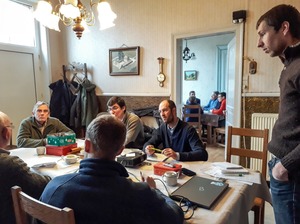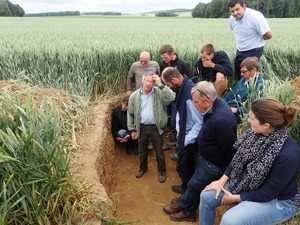Case study 12: Belgium: Sustainable diversification of no-till/no-pesticides stockless cropping systems – "ABC Group"
Cluster 3: Crop diversification in systems from Western Europe
Regarding cropping system diversification, soil management and weeds control, organic and conventional no-till arable farmers complement each other in terms of strengths and weaknesses. Organic farmers tend to have more diversified rotations and make use of intercropping but weed control is based on intense tillage and ploughing. For no-till conventional farmers cover crop, companion plants and relay cropping are key agronomical practices but weed control is based on intense herbicide use. To share the strengths and competences of each farmer, a mixed group was born with the support of an advisor and a research organisation.


What were the main problems underlying the emergence of the case study?
More and more farmers are investigating the possibilities of interconnecting organic (no-pesticides) and soil conservation (no-till) arable cropping systems and practices in order to improve the sustainability of their cropping system. Even though the benefits of diversification are well known by farmers to control weeds or to improve soil fertility and soil structure, there is a lack of knowledge about no-till, no-pesticides innovations. Therefore, farmers need to share their expertise and imagine new rotation schemes and technical rules in order to address this challenge. Several issues, however, make that objective difficult to reach, for example divergent concerns between organic and conservation farmers, the need for investment in specialized machinery and regulations out of line with innovative practices.
How was the problem addressed and which actors were involved?
The case study was initiated by the association of two farmer groups: one conventional group with no-till systems, facilitated by Greenotec, and one organic group, facilitated by CRA-W. It became the ‘AB-AC group” which derives from French words “Agriculture Biologique” (Organic Agriculture – AB) and “Agriculture de Conservation” (Conservation Agriculture – AC).
In an effort to share experiences between both farmer groups, Greenotec and CRA-W launched a “field visit” in 2016, which was a success. Since the beginning of DiverIMPACTS, meetings, field visits and on-farm tests and trials have been organised to enable the farmers in the group to exchange about the issues they are facing and think collectively about solutions. The group's organization is constantly evolving to meet its needs. For example, advanced external knowledge has been requested and integrated into the meeting programs. Recently, one-off tests have been replaced by the establishment of a long-term system experiment distributed in a network of farm plots.
Solution investigated
There is a need to foster co-learning between organic farmers in arable cropping systems and farmers in no-till systems, to co-design innovative, no-till-no-pesticides cropping systems and practices. To this end, case study 12 aims to:
- Identify how diversification schemes are used to improve and maintain soil fertility and structure, on the one hand, and to control weed and disease on the other hand in such challenging cropping systems;
- Make the organic arable farmers more at ease with no-till and multiple-cropping techniques, and identify interests in using crop rotation to address weeds, diseases, and soil fertility management;
- Increase confidence of no-till farmers in the feasibility of using less or no pesticides and mineral fertilizers before considering conversion to organic farming.
Some practices have been tested on farms such as companion legumes in several cash crops (rapeseed, maize), relay cropping of cover crops in winter cereals, various cover crop destruction techniques, direct sowing, early sowing of cereals with or without companions plants, and grazing of cereals (cover crops) by sheep. These individual tests have now been replaced by a long-term system experiment distributed between the farmers of the group. In this group experiment, the innovations look at the entire system with the aim to transition towards no-till / no-pesticides cropping systems.
Expected outcome
- Identify suitable diversification schemes and rules in order to combine organic and no-till practices to transition toward agro-ecology and sustainable cropping systems
- Decrease herbicide use by no-till farmers
- Decrease tillage by organic farmers
- Adapt regulations that prevent innovative practices from emerging
- Gain knowledge and experience about how to promote changes at the farmer level
- Develop participative methods adapted to the farmers’ and research’ needs
Relevance for the DiverIMPACTS goals?
Hypothetical no-till-no-pesticides cropping systems should favour biodiversity above and under the ground compared to organic systems disturbing soil life and no-till systems using pesticides. Diversification of these cropping systems through rotation, cover cropping and companion crops is essential to implement these systems and contribute to their sustainability.
Case study legacy
With the end of DiverIMPACTS, the five-year partnership between the farmers, Greenotec and CRA-W is also coming to an end. So far, we don’t know what the future of this rich experience will be. That said, the advisors and researchers in the case study are eager to continue this cooperation with two distinct groups: one composed of organic farmers, the other of no-till farmers, while organizing specific activities dedicated to the meeting of the two groups. This option still needs to be discussed with farmers collectively.
The objectives were:
- to inform and document the process of systemic and technical innovations at the cropping system scale,
- to concretely stimulate innovations in the farmers' practices,
- to provide concrete information and instruction about the conditions necessary for to realise the practices, and
- to validate the impact on soil fertility and the environment.
Both the failures and the successes of this experience contribute to the heritage of the case study. The case study legacy concerns both actors of the agri-food system and research actors involved in the agro-ecological transition.
The most tangible legacy will be a collaborative experience shared by a team of researchers, a team of advisers and a group of farmers. An individual and collective assessment of this experience is will be completed by the end of June 2022. It will explore the ability and the opportunity to grow these experiences further within one (or more) group(s) resulting from a reconfiguration of this initial dynamic with the support of other research projects (e.g., ClieNFarms or Agroecology-Transect).
Further information
Links
zenodo.org: Practice Abstract: Co-designing innovative cropping systems through long-term on-farm experiments
Case study team
- Aline Fockedey, case study leader
- Daniel Jamar, CRA-W, case study monitor
 tap and then scroll down to the Add to Home Screen command.
tap and then scroll down to the Add to Home Screen command.